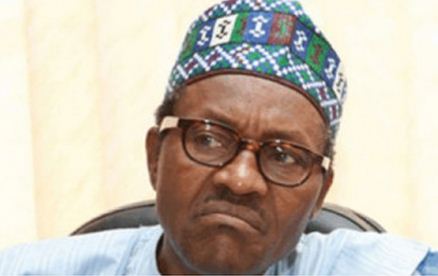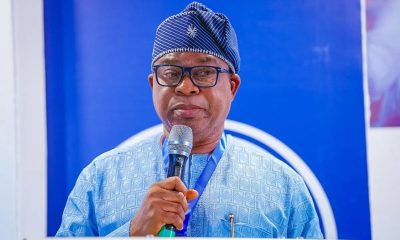News
8 Months After, Buhari Yet To Send Supreme Court Justice-Nominees To Senate For Confirmation

President Muhammadu Buhari’s lukewarm treatment of the judiciary has been highlighted in his refusal to send names of justice-nominees to the senate for confirmation.
President Muhammadu Buhari
President Muhammadu Buhari
The delay by President Muhammadu Buhari to forward to the National Assembly for confirmation, the four Supreme Court justice-nominees approved by the National Judicial Council (NJC) eight months ago, to fill the vacancies at the apex court, has triggered concerns in the judiciary, THISDAY’s investigation has revealed.
Some senior lawyers described the delay in the confirmation of the justices as not in the interest of justice.
The bench of the Supreme Court consists of 12 justices instead of the stipulated number of 21.
Chief Justice of Nigeria (CJN), Justice Ibrahim Muhammad, had on several occasions lamented the excruciating workload of justices of the apex court as a result of the depletion of the bench.
NJC, on October 24, 2019, had approved and forwarded names of four justices of the Court of Appeal to Buhari for confirmation as justices of the Supreme Court.
They are: Justice Adamu Jauro, Justice Emmanuel Agim, Justice Chuba Oseji and Justice Helen Ogunwumiju.
However, nearly eight months after, the president has neither rejected any of the nominees nor forward list to the Senate for confirmation.
Instead, THISDAY learnt that the names of the nominees were sent to the Department of State Services (DSS) for scrutiny.
Multiple sources close to NJC told THISDAY that the development is strange to the nation’s judicial system and unknown to law.
According to them, this would be the first time in Nigeria’s judicial history that such would be happening in elevating justices to the Supreme Court.
One of the sources said subjecting the nominees, after their approval by NJC, to another scrutiny by DSS has ridiculed the judiciary.
According to him, if DSS report does not favour the elevation of the justices to the Supreme Court, the worst thing that could happen is that they would retain their position as justices of the Court of Appeal.
He explained that DSS has no power to recommend their removal, but rather it’s NJC that is vested with such power.
“If the DSS report does not favour their elevation, the worst that can happen is that they will retain their positions at the appeal court because DSS has no power to recommend their removal. If they are retained, won’t the DSS report put their integrity in doubt? The point is that NJC is the final authority in the scrutiny and not DSS,” he stated.
Another source said any further delay in confirming the justices would affect the workload of the justices at the apex court, adding that with some of them are due for retirement with no replacement.
He said: “The judiciary in the country is presently in danger because what has not happened before is happening now. Subjecting justices already approved by NJC for elevation to the Supreme Court to another check by DSS has set the judiciary backward.
“NJC is the body recognised by the constitution to recommend justices for elevation to the president for confirmation. What DSS is presently doing is not known to any law.”
DSS spokesman, Dr. Peter Afunanya, was yet to respond to THISDAY inquiry on the delay in considering the nominees as at the time of filling this report.
Also, the presidency is yet to explain or give reasons for the delay in the appointment of the justices.
Delay in Confirmation Not in Interest of Justice, Say Lawyers
Some senior lawyers have described the delay in the confirmation of the justices as not in the interest of justice.
They told THISDAY that the delay is increasing the workload of the justices of the apex court, and impacting negatively on justice delivery.
To Mr. Akinlolu Kehinde (SAN), “There are some information about governance that may not be available to the general public. But whatever may be the legal reasons why the appointment has not been confirmed till date, Mr. President should in the interest of the nation, which he swore to protect, defend its constitution and its teeming population, confirm the appointments or decline with cogent, convincing and compelling reasons. Because as far as I am concerned, those legal luminaries recommended are part of the topmost cream in the judiciary. Just go to the pages of the law reports and see their unassailable interpretation of the law.”
He added that Nigeria has a large pool of other willing, qualified, competent and upright hands that have not and would never bow their heads to mundane considerations to fill the vacancies.
“More importantly, the workload at the apex court is grossly overwhelming for the current number of justices there and the consequence of this is that access to justice is directly being denied the citizens. And you know that where there is no justice there can be no peace.
“The buck stops currently at the table of Mr. President and I pray that the issue will be addressed without further delay,” he added.
Another senior lawyer, Mallam Ahmed Raji (SAN), said the delay in concluding the process appeared to be unjustifiable.
He said: “The number of vacancies in the highest court overburdens the remaining law lords and it is very unfair to the remaining justices. It is taking a great toll on their health and general wellbeing.
“We should all prevail on the executive to do the needful. Whenever there is a vacancy in either the executive or legislative branch, such is always filled without delay! What has the judiciary done wrong to warrant this treatment?
“I call on both the executive and legislative arms to do the needful before they are justifiably accused of conspiracy to cripple the third arm of the government.”
Mr. Dayo Akinlaja (SAN) agreed with his colleagues, saying “there can be no measure of doubt that the failure to give the Supreme Court its full complement of justices is a major impediment to the expeditious and effective dispensation of justice in the apex court.”
Akinlaja noted that even with the benefit of the full complement, it would still be a herculean task for the justices of the apex court to effectively cope with the deluge of cases from across the country coupled with the inundating backlog of cases in the court.
“It is well known that the justices of our Supreme Court are the most tasked all over the world. In light of this scenario, it is simply imperative for the court to be filled to its constitutional capacity of 21 justices with promptitude.
“To say that this is the clarion dictate of justice is to say the obvious and sound pedantic. In the words of Shakespeare, brevity is the soul of wit. One needs say no more than to opine fiat justitia,” he added.
ThisDay
-

 News4 days ago
News4 days agoOsun 2026: Dayo Fasola Congratulates AMBO On Emergence As APC Flag‑Bearer, Calls For Party Unity
-

 News4 days ago
News4 days agoOsun 2026: Aremo Congratulates Bola Oyebamiji On His Emergence As APC Gubernatorial Candidate
-

 News5 days ago
News5 days agoAIO Felicitates AMBO On His Emergence As APC Gubernatorial Flagbearer
-

 News3 days ago
News3 days agoOsun 2026: Action Alliance Elects Farinloye As Governorship Candidate, Pledges People-Centred Governance


